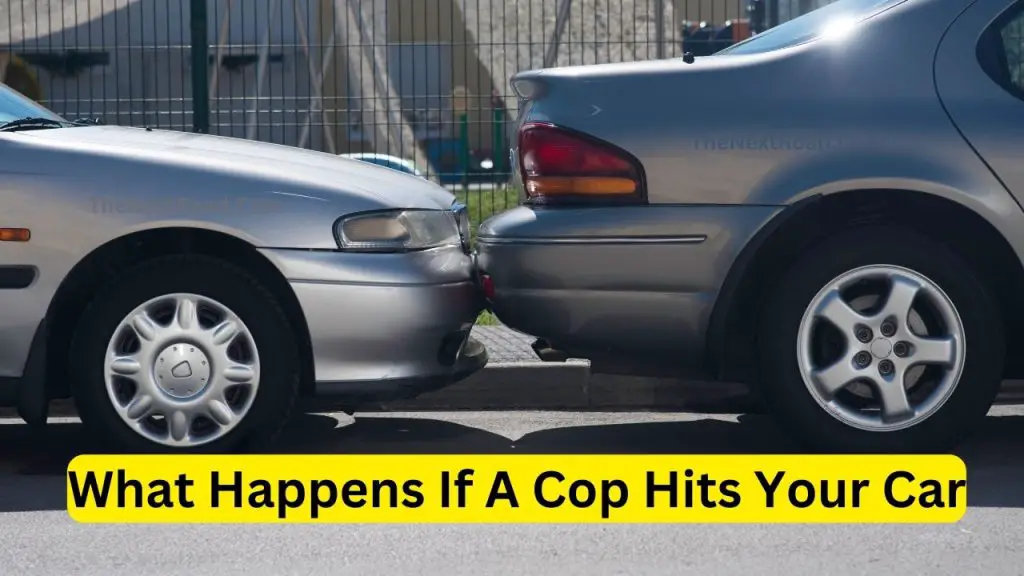Did you know what happens if a cop hits your car? If no this article is for you. This article aims to untangle this perplexing question and provide clear guidance on your next steps should you find yourself in such an unfortunate situation. Buckle up, we’re about to take a deep dive into the protocols when law enforcement becomes an unexpected participant in traffic collisions.
What to Do Immediately?
When the unimaginable happens, and you find yourself in an accident caused by a police officer, you may feel overwhelmed. The adrenaline rush coupled with the sudden shock could throw you off balance. However, your actions immediately following such an incident are extremely crucial.

What Happens If A Cop Hits Your Car? in Short form
In simple word, if a cop officer hits your car, follow these steps:
- 1. Prioritize Safety: Ensure everyone is safe and seek medical attention if needed.
- 2. Notify Police: Even though an officer was involved, still report the accident to their department.
- 3. Document Everything: Take photos, write down details like time, place and how it happened.
- 4. Get Witness Information: Ask any witnesses for their contact info and statements.
- 5. Exchange Information: Obtain the badge number, name of the officer, patrol car number, insurance information etc.
- 6. Inform Insurance Company: Report the accident to your insurer promptly.
The police department’s internal affairs unit usually investigates these incidents and you may need to file a claim with the city or county’s insurer instead of dealing directly with the individual officer’s insurance company. However, this process can vary from location to location so local legal counsel might be necessary for complicated cases or serious damages/injuries.
Importance and Procedure
Reporting the accident, regardless of whether you think yourself responsible or blameless, is crucial. This process serves as your initial formal narrative of the event and plays an essential role in any subsequent lawsuit or insurance investigation that may follow. It’s also critical to keep in mind that these instances aren’t always clear-cut. Thus, failure to report could possibly paint you in an unfavorable light later on.
The procedure of incident reporting comes with its own set of unique nuances when law enforcement officials are involved in the collision. First, ensure everyone is safe and then immediately call another police officer to the scene – even if the officer involved suggests handling things differently.
Photographic and Witness Accounts
Whenever a police car is involved in an accident, gathering credible evidence remains paramount for any ensuing investigation or litigation process. Visual evidence such as photographs from different angles of the damaged vehicles becomes incredibly valuable in this pursuit. Even minute details like skid marks, street signs, or broken glass can add considerable weight to your claim.
Claim Filing and Coverage
Peeling back the layers of insurance intricacies after a collision can be daunting, especially when it involves a law enforcement vehicle. Yet, understanding the basics of claim filing and coverage becomes your knight in shining armor during these tough times. It’s not just about figuring out who’s at fault but comprehending how to navigate through the intricate labyrinth of protection policies is vital.
Your best bet isn’t just reaching out to your insurer immediately (although that’s indeed important); it’s also speaking with an attorney who specializes in such situations. The intersection between insurance claims and government liabilities is often filled with fine print and legal hurdles that require expertise to maneuver effectively. Public entities like police departments may have different restrictions; knowing this beforehand alters how you play your cards.
Remember, understanding this complex process from a new angle doesn’t just protect your wallet—it grants you peace of mind during an otherwise stressful ordeal.
When To Contact a Lawyer
Legal situations can unfold unexpectedly, even with those tasked to protect our safety. In the event that a law enforcement officer hits your car, for instance, it can seem daunting. This is where the expertise of a lawyer becomes truly invaluable. Lawyers are adequately equipped not only to navigate through intricate legal procedures and jargon but also to balance power dynamics ensuring your interests aren’t compromised.
Internal Investigations & Penalties
Mitigating the aftermath of a police-induced car accident is a complex process that extends beyond repair costs and insurance claims. At the heart of this nuanced situation lies an often hidden but critical aspect: Cop’s Accountability – which chiefly comprises of internal investigations and penalties. It’s surprising yet vital to understand that when cops are involved in car accidents, the implications aren’t as straightforward compared to civilian cases.
The crux here is starting an Internal Affairs Unit investigation, which is a Canada-wide policy for severe instances including serious traffic accidents involving peace officers. These independent entities delve into multifaceted layers ranging from possible violations of law enforcement regulations to instances where officers use their position unethically while driving.
Conclusion
To sum up, you should get paid for any harm that was done to your car if a police officer strikes them; they are not at fault. Variations in procedure mean that you should always get legal advice from an experienced attorney who can help you through the legal system. Recall to report the occurrence very away and get whatever proof you can at the spot, such as pictures or witness contact information.
The Next Road (thenextroad.com) is an affiliate of the Amazon Services LLC Associates Program, so you can access the Amazon marketplace when on this domain. We will earn a commission from your qualified purchases.